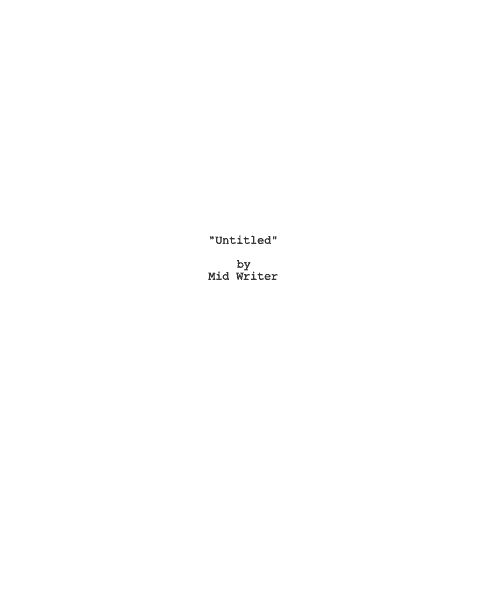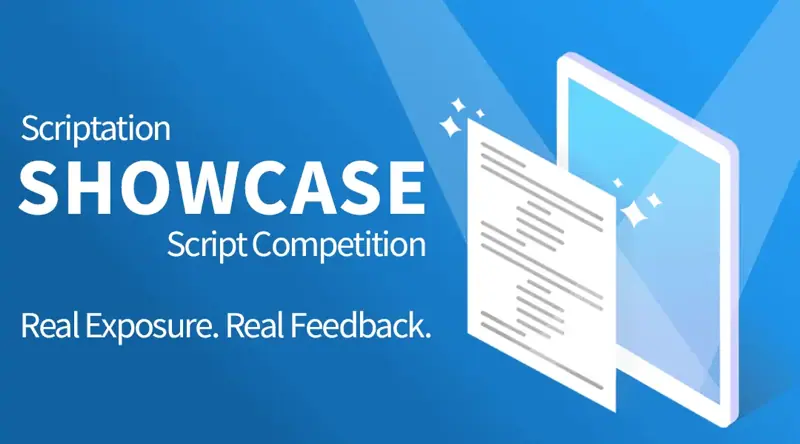You’ve got a lot of fun ideas. You know how to write a script (mostly). So you want to try and write a script full of fun ideas that someone reads (mostly). After they read it, you’d love for them to love it; enough to want to buy it. This is the goal of the writer of comedy, the smiling face behind a laptop throwing around set ups, blows and buttons as fast as their fingers can type. You’re almost assuredly writing this on spec – aka, on speculation – meaning you are not getting paid to put fingers to keyboard. Payment, the quid, will come down the line for the pro quo of the completed script. But how do you write the comedy script that sells? These tips, guidelines, and absolute laws may not lead to a giant check, but they’ll lead to more doors opening than any other script you could possibly punch out.
SELLING A PILOT SCRIPT
1. BE FUNNY
First off, this post isn’t about how to write a drama script that sells. Yes, while many of the same ‘writing a script that gets attention‘ rules apply no matter the genre, this article is focusing on the 100% undeniable COMEDY script. Yes, there are half hours that have won awards that are inarguably not hilarious. You can read about how to write them somewhere else. To get the jump on how to write a comedy script that sells, read on.
This is about funny. Bringing the funny. Being funny. Knowing how to set up and execute a joke is something you need to be able to accomplish on the (script) page if you hope to get any kind of response to your script.
This “SNL” sketch is, undeniably, funny:
COMEDY WRITING HELP
2.BE FUNNY ASAP
As in, you have a joke on page one. A huge joke. Not a joke about size specifically, or a joke in a huge font, but a joke that will grab the reader by the face and announce to them, “The writer of this script is funny!”
Too many want-to-be writers take so much time developing their story, characters, and details that they forget someone is going to come into this script with fresh eyes and be looking not for a third act twist, not a nod to the French New Wave with a clever bar name, and not characters who’s names are fresh takes on old classics (Rome and Julie, anyone?). What they are looking for, in this comedy script? JOKES.
Does your story roll out in such a way that you have a joke on page one, but it’s a small joke? A joke that’s, you know, true, and solid. But the most you’d get from it is a head nod? Then the rest of the script better be UNBELIEVABLE. Those big jokes need to come out of hiding within the first five pages of this script, or you’re wasting your time (and more importantly, the readers’).
A hilarious start is especially helpful for scripts entered into screenwriting competitions. Readers and Judges are working their way through the huge pile of entries, and the sooner you can display your comedy excellence the better chance you have of making it to the winner’s circle. One of the absolute best script competitions for comedy writers is the Scriptation Showcase, now entering it’s sixth year of boosting undiscovered writers of any genre. Founded by a contest-winning comedy writer who knows the value of an unproduced scribe (Steve Vitolo – The List, black-ish, Hot in Cleveland), the Scriptation Showcase is a great place to audition your new script after you’ve revised it for all of the pieces of advice listed here. Entries for 2025 are open now!
So, you’ve written your great, sharp, hilarious comedy spec script. Then, you’ve somehow done one of the hardest steps of writing a comedy script that sells; getting someone who can buy it to read it. Remember, this person is taking time away from all the other things they could be doing to read yours. They will likely give you about five pages before they bail. Because…
COMEDY SCRIPT SELLING
3.FIVE PAGES VS THIRTY PAGES
… they’ve read scripts before. Good ones. Terrible ones. “Meh” ones. After reading enough of all of them, good writers know how to recognize good writing. They get what the writer is going for and can follow along, often enjoyably, with the characters and story.
They also know how to recognize when someone is not necessarily a bad writer – but their script may be badly written. So after a page, two pages, three pages, they have a pretty good idea of where that script is going to take them even if they don’t read the rest. That’s why you need your first five pages to be out-of-this world excellent. If they’re not, your reader may finish the whole script (a friend will, a reader at a company or a producer will not), but they’ve already checked the ‘no’ box in their head of whether they’re going to pass the script along to anyone else, work with you, or – of course – buy it.
Thirty pages of your spec script tell a story; as a whole, every single word is important, but none are as crucial to your success as those first five pages. When it comes to writing a comedy script that sells, those first five pages MUST literally show the world that you know what you’re doing.
HOW TO SELL A COMEDY SCRIPT
4. HAVE A CONSISTENT TONE
Both in and past those crucial first five pages of your spec script, what kind of comedy are you writing? Slapstick? Screwball? Yes, there is a difference between the two. Cracker dry wit? Dialogue heavy? Character based? Where do the laughs come from, and, do they come from a place that’s consistent?
Maintaining a consistent tone tells readers not only that you’ve thought of how your script is written, but that you’re in control of it. If you’re writing about a single dad fighting to maintain a work/life balance and the dog starts talking to him… you’re in wacky land. That’s okay, as long as the script knows it’s in wacky land.
Another way of thinking about it:
Is your script more David Mamet or David Wain?
Is your story more Jim Carey or Jim Jarmusch?
Is your main character a Mary Tyler Moore or Joel David Moore?
Maintaining a consistent tone keeps your reader in the story. Wildly jumping between different tones will take them out of it, as they realize you don’t know what kind of story you want to tell. So they won’t wait around for another draft where you finally do.
Listen to this interview from Screaming into the Hollywood Abyss with the hilarious Mike Scully to get an idea of a writer who has mastered delivering a consistent tone:
COMEDY WRITING ADVICE
5. HAVE DISTINCT CHARACTERS
Do your characters have a unique perspective? A memorable voice? Something to say? Or all they all named Cop #1?
Who your story is about is more important than what. People connect with good writing through good characters, whether it reminds them of someone they’ve met in real life or on screen. Good characters leap off the page, and being able to write good characters goes hand-in-hand with good writing. Writing a comedy script that sells means writing a script with memorable, funny, identifiable characters.
If everyone sounds the same, no one stands out. If everyone yells at each other for your entire script, none of it means anything. No one has any kind of growth or temperature to rise or fall from. Have your characters be at different levels to help the reader keep them apart. Imagine them as colors; if all your characters are green, none of them stand out. But a green, a yellow, a red, and a blue? That’s Seinfeld. Add a brown and a purple, now you’re at Friends. Put them in orange jumpsuits, Orange is the New Black. You get it.
Your script is about something, hopefully yes, but it’s about characters most of all. And characters are what make great comedy (that sell).
Use the Scriptation Highlight feature to easily track your characters and their lines to see how different they are coming across in dialogue.
HOW TO WRITE A SPEC SCRIPT
6. YOUR SCRIPT IS 30 PAGES (OR LESS)
When an experienced script reader opens a PDF, they look to see how many pages they’re dealing with. It’s the quickest way to know if the sender of the script knows what they’re doing. A comedy that’s 45 pages? Is too long. A comedy that’s 31 pages? Maybe not as long, but showcases that the writer couldn’t edit themselves enough to get to that warm, gooey center of a 30 page comedy script.
Add a title page? Well now, if you can keep your script to 28 or 29 pages, that reader is going to immediately know they’re reading a script written by someone who not only knows how long a script should be, but was able to tell their story in that page allotment.
Think we’re being too literal? There are studios that have a policy of deleted scripts on-sight if they are over a certain page count. That’s certainly NOT the best way to write a comedy script that sells.
Part of being a great comedy writer is knowing what jokes to cut; killing your babies, darlings, however you’ve heard the phrase. One hundred OK jokes is not as good as 75 great ones.
BEST COMEDY SPEC SCRIPT IDEAS
7. BUILD A WHEEL BEFORE YOU REINVENT IT
Does your script break the format in a new way, pushing boundaries and smashing conventions? Good for you! Surely, it’s a different read than the rest (and don’t call me Shirley). But if this is the first work of yours someone is reading, they may worry that you don’t know how to tell a conventional story, joke, or write for characters who aren’t a talking trash can.
Being John Malkovich, My Crazy Ex Girlfriend and Pulp Fiction, to name three very different examples in both tone and execution, all started with great scripts that were structured in unconventional ways. They were also not the first pieces of writing Charlie Kauffman, Rachel Bloom, or Quentin Tarantino got paid for. They all worked in different capacities of different projects that were not the ground-breaking, tone-shifting, genre-bending works that they would later be known for.
We’re not saying it’s not great to have an outside-the-box script in your portfolio, of course. You just need to have one that shows you can do the conventional – if needed – as well. The more cards you have to play, the better.
This sketch from “I Think You Should Leave” is a great example of a simple premise, executed perfectly:
WRITING A TV COMEDY SCRIPT
8. TYPOS?
They happen. Formatting errors, happen. Leaving off punctuation at the end of a paragraph, happens
(We did the above on purpose, FYI)
But if you get the wrong reader on the wrong day, it could cost you. So have a second set of eyes read your script, comb through it with a fine-toothed pen, and make sure this is the cleanest script you’ve ever sent out. Typos on the first page, the cover page, in the email… they just show a lack of detail that, for some, is enough to not continue reading your work.
Thems the breaks. Proofread.
HOW DO I SELL A COMEDY SPEC?
9. THE TITLE MATTERS
So many times in TV, a staff writer sends in their first script and the title page says “Untitled” (or, more often, hasn’t been changed over from the template the Script Coordinator sent them). They’ll say they weren’t sure that was up to them, or they couldn’t think of anything, or they didn’t want to assume they got to name the episode… titles are easy to change, but hard to come up with. So having one to work off of is always a plus.
The same goes for your spec. “Untitled” by Your Name may have a certain mystery to it, but it also goes in a pile with the hundreds of other “Untitled” scripts by someone not creative or seasoned enough to know how important a title is to getting their project read.
Which of these would you rather read?
“Untitled” or “The Hilarious Horror of Henry“?
“Untitled” or “Blunt Force Drama“?
“Untitled” or “Hot/Sexy“?
Anything that helps your script stand out, HELPS YOUR SCRIPT STAND OUT. Why not start with the beginning, and give your script a title that makes the person want to read it?
Puns are OK. Alliteration is OK. Changing something ever so slightly, OK. Don’t be vague (“Bad Company“), don’t be redundant (“Unsold Comedy Spec“), and don’t be misleading (A script called “Dragon Orgy” better, at the very least, feature one of those two).
But always, always, always give your script a title.

COMEDY WRITING JOBS
10. ORIGINAL PILOT OR SPEC SCRIPT?
This is an age old question for writers both new and established, one that has the answer change depending on the mood and temperature of the market and community at any given time. Too many people writing variations of the same “Modern Family“? Then it’s a call for original pilots. Too many original pilots about parents moving in with their kids? Then someone wants to read your “New Girl“.
There once was a time when your spec of an existing show had to be from a Network sitcom that was between seasons 2 and 5, and still on the air. Then came a time when it became more acceptable to do specs of existing shows – on air or long gone – that became a breath of fresh air for readers of multiple writing samples. Original pilots have to set characters and establish a world, while specs of existing material comes with a built in familiarity.
So we’ll break it down like this; it’s great to have options for both.
a-fusion-font=”true”>For a writing sample to get you a job, a spec script is great. Showrunners will often enjoy seeing that you know how to match someone else’s voice, as well as bringing new thoughts to an existing area.
You will NOT sell a spec script of an existing show. If you heard of someone doing so, it’s like hearing someone won the Toys R Us shopping spree; sure, it may have happened, but it’s not happening to you. It’s frowned upon for anyone working on a show to read a spec of the show, as the spec writer could then argue that ideas from the script were taken (even if the writers had already written something similar, before anyone read the spec script). You’re limiting your audience, in some ways.
So if your goal with the next thing you write is $$$, write an original pilot. The rights and characters of that story are owned by the writer, and you control them until someone writes you a check.
COMEDY SCREENWRITING HELP
11. BUT HOW ORIGINAL?
Be smart. A Harry Potter parody may be a great read, but not something that is likely to sell. If it’s good, and creative, it could get passed around to the right people and you might get some meetings out of it at the very least.
If it’s too close to the valuable IP? Your going to have people more worried about lawyers reading your script than anyone who can open purse strings.
So forget parody, what about an homage to your favorite program? If it’s about a bunch of people at a bar, well, it could be “Cheers“, “It’s Always Sunny in Philadelphia“, or “Happy’s Place“; you’re not necessarily breaking new ground with the setting, but you can do enough with the characters and tone to make it your own.
That gets to the most important piece of advice for writing a comedy script that sells – your voice. You need to have your voice as a writer jump off the page in an undeniable way. You need to make the reader put the script down thinking, “I need to work with this person.”
Simply put, you need to write the best thing you’ve ever written. The rest will follow.
Good luck, and good writing.


